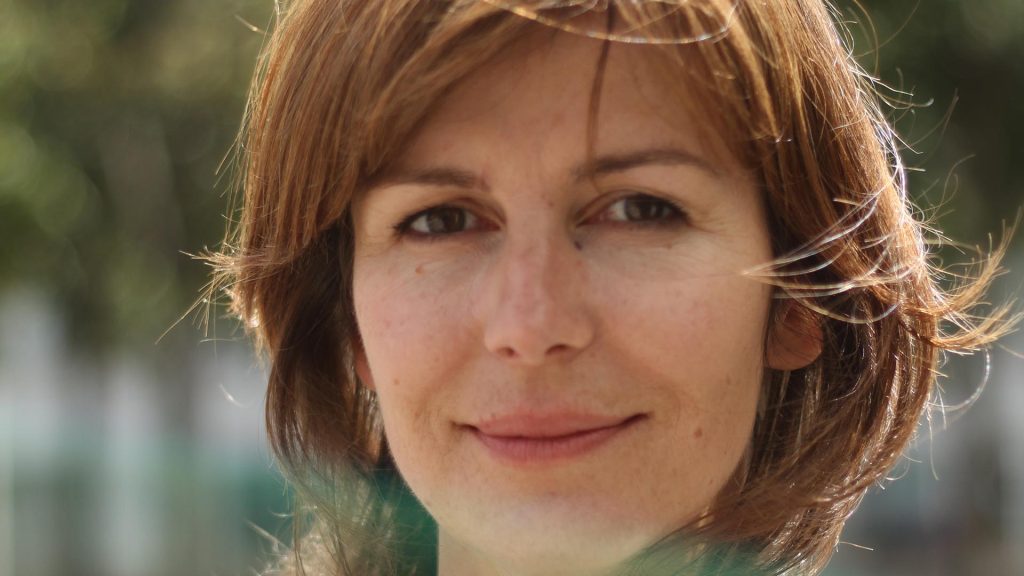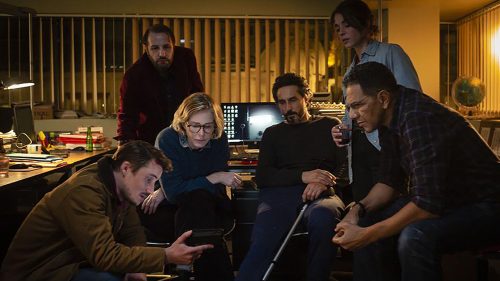
Alix Delaporte began her career as a cameraman and reporter for television. She ventured into cinema by studying screenwriting at La Fémis in Paris. It was a natural progression for this director, who gained recognition for her short film Comment on freine dans une descente, which was awarded at the Venice Film Festival in 2006, and directed two feature films, Angèle et Tony and Le dernier coup de marteau. Nine years after her last work, Alix Delaporte returns to Venice with Vivants, a story centered around a group of reporters who are always passionate, often amusing, and occasionally marked by life and their profession.
How did you come up with the idea for this film? Did it stem from your experience as a journalist and your desire to spark a debate about who, among the audience, producers, and journalists, actually creates information today?
My priority was to create an ensemble film. One day, I wrote thirty pages that featured a group of friends, a love story, and the production of reportage. Without making a definitive decision, the narrative emerged in this way. Naturally, having been involved in the journalism field for many years, I am well acquainted with this universe. However, I wanted the film to have a broad scope and be understandable to everyone. The issue of budget reductions exists in various work sectors, not just in investigative journalism. The film’s goal is to evoke empathy for the characters and, as a result, generate interest in their profession and the challenges they face.

A young woman, Gabrielle, is hired by a prestigious French TV station that specializes in investigative reporting. While not formally trained, Gabrielle gives her all in her new, exciting world. She learns the codes and languages of journalism, puts herself to the test, and st...
After your first two films, which featured the same duo of actors, Clotilde Hesme and Grégory Gadebois, it seems that you are exploring a new genre…
I had the desire to change dimensions: I started with reportage, then I made more intimate films, now I want to grow. For the first time, I worked with a crew of five actors, and only in this way can one broaden the scope. For me, Vivants represents the conclusion of the trilogy that began with Angèle et Tony and Le dernier coup de marteau. There is an intimate foundation, a genuine interest in the lives of individual characters within a larger context and with significantly more substantial production. The journalist’s camera with which I began my career allowed me to create a feature film: I integrated it into my fiction and, in a way, I closed a circle. It’s a way to conclude one cycle and start a new one, with less intimate films built with more powerful resources. My next film will be in English (I am of Franco-English heritage), representing a significant expansion of my horizons.
It has been nine years since your last feature film. What has happened during this period?
This film talks about the end of an era, that of the great reports. It explores a period in which things become increasingly difficult to accomplish. I believe it is essential to have a certain temporal distance from a specific era in order to speak about it meaningfully. After working as a journalist for ten years, I never stopped working, but I felt the need to take some distance. I started to observe things from afar while continuing to write.
What do you expect from the Venice festival?
I consider Venice one of the most beautiful film festivals in the world. I have a special connection with this event, and I am very fond of it because it has accompanied my growth. There is a line in the film that summarizes very well what I feel about the idea of presenting the film in the Sala Grande: “It’s not the size of the screen that matters, but the presence of the people around it.” For me, the physical presence of the Venice audience matters more than anything else.